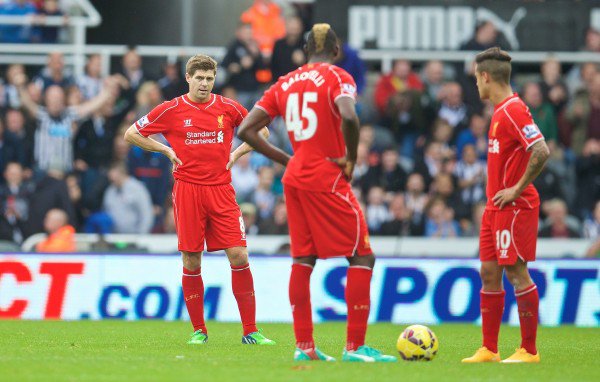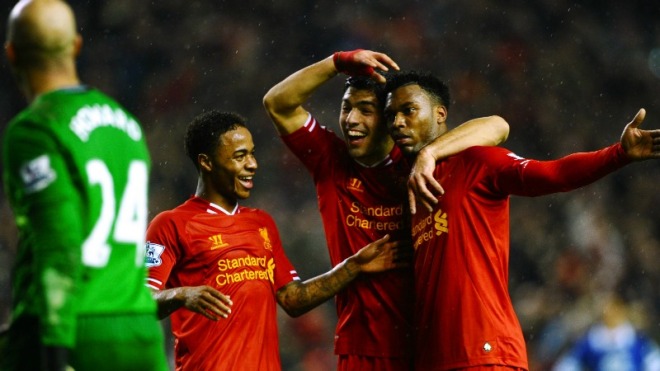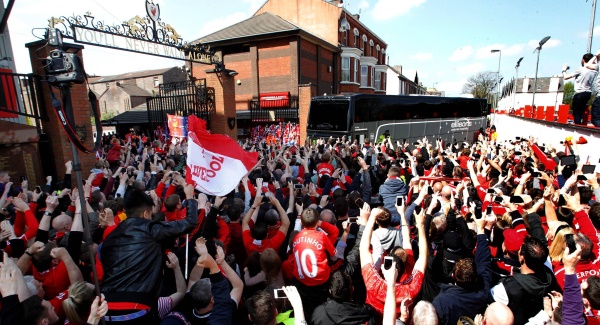A little over 18 years ago, in 1996, Kenny Dalglish’s title winning Blackburn Rovers team inexplicably slumped down six places into seventh. That same year, coincidentally, also saw Kevin Keegan’s free-flowing Newcastle United emerge as title challengers, finishing in second place for two consecutive seasons, only to follow that up in 1998 by free-falling into thirteenth. Fifteen years later, Alex Ferguson brought the curtain down on his illustrious career as his final Manchester United team positively coasted to a 20th league crown. That same team, largely, then spent the first year of a new era under David Moyes limping to their lowest league finish in 24 years, as they ended the 2014 season in seventh. Now, whilst there was a context to each of these collapses, it cannot be argued that the sudden and comprehensive nature was surprising, to say the least.
The same can be said of this seasons Liverpool. What has become of the side who so very nearly plundered their way to a first league title in 25 years, becoming only the third in Premier League history to record a century of goals in the process? A side who scored four or more in no fewer than eleven league fixtures, and failed to find the net just twice all season. It’s a myth that Rodgers’ Liverpool were consistently producing the mesmeric, fluid, magnificent attacking football for which they’ve become associated throughout the last campaign, of course. They didn’t. They evolved towards and into that. But what they – and Rodgers – were above all else, was pragmatic, and motivated – and together. It felt, for the first time in a long, long time, as though the club was as one. Owners, manager, players – and supporters. A single being with a singular aim. Unity reigned, with a determined eye focused on an ultimate prize. Questions were asked, and invariably answered. Be it a personnel change, or a systematic one; lessons were continually learned and the team on the field adapted accordingly. Backed by a fervent red tide, players and manager grew visibly in stature week on week. The end result was a collection of players hitting heights that many had never achieved previously, and some probably never expected to achieve at all, moulded into a group unwilling to accept either their own apparent deficiencies, or the limited expectations imposed on them.
Just a few months on and what we see before us has become unrecognisable. The belief and confidence that swept all before them at times last season, eroded and replaced with hesitancy and confusion. Pre-game huddles and passionate battle cries replaced with bowed heads, slumped shoulders and increasingly, what can only be described as acceptance. Not only on the field, but in the stands too. The thousands that welcomed the the team home every other week amid the kind of scenes typically reserved for returning heroes have retreated, puzzled at what they’re now witnessing, swallowed by the masses on the terraces and in the pubs, now surrounded by doubt, frustration and bewilderment. The minority of unyielding pessimists, ogre like in their apparent unwillingness to experience joy, where silent for the last eighteen months, now emerge and grow ever more vocal. The kind of performances, results – and nonconstructive arguments – that are dangerously close to becoming normal once more were unthinkable last season.
As things stand, after 11 games Rodgers’ Liverpool find themselves in 11th place, having amassed just 14 points. That’s an average of 1.27 points per game. To put that points total into some context, it’s one fewer than the disastrous Roy Hodgson managed over the same period. It’s also an average that, if extrapolated over an entire season, would equate to a final total of a startling 48 points. Last season that total would have seen the Reds finish in the position they currently occupy – 11th. Comparatively, at this stage last term, after what was widely acknowledged as a slow start to the campaign, they sat second in the league on 23 points, running at 2.09 points per game. Whilst it’s important to remember that landscapes can and do change very quickly in football, it’s also worth noting that if we were to accept that 2 points per game typically guarantees a top four finish, and take that as the target for the season, then from this point on, in order to hit that final total they would need to start running at 2.27 points per game. To put that figure into perspective, over a full season that would equate to 87 points – one more than last seasons champions, Manchester City, managed. The league season may be just eleven games old, but the hole that Rodgers and his team are digging themselves into is growing deeper with each dropped point. Even at this early stage, it’s only the equally erratic results of the expected challengers that offers hope of redemption.
So, what’s changed?
As cliched as it’s become, you can’t begin to answer that question without first acknowledging the most obvious answer; Luis Suarez. One of the top handful of players in the world, and arguably unique in terms of his insatiable desire to win, to overlook his departure as anything other than key would be foolish. Any team in the world would miss such a player. Similarly though, to argue that it was he alone who lifted last seasons Liverpool team to new heights would be blinkered and simply untrue. It’s easily forgotten that Luis Suarez missed the opening months of the last campaign, and in his absence the team still produced top four form. Equally, Luis Suarez was at the club for two and a half years prior to last season, and a year and a half prior to Rodgers, and in none of those seasons had he – or the team – produced anywhere close to that level of consistency. Indeed, they had finished those seasons – with Luis Suarez – in 8th, 7th and 6th. So whilst it’s possible, even likely, that Suarez made the pivotal difference in propelling his team from Champions League contenders to within two points of the title itself, it’s surely a stretch to offer his departure as the sole explanation for the alarming regression witnessed in this seasons opening months.
The attacking unit that he formed a part of, and the one which formed the basis of last seasons success, is a far more probable starting point. An attacking unit centered around speed (of both body and mind), intelligent movement, intensity and aggression. At times this season we’ve witnessed the bare minimum of those key facets. At others, none at all. It’s been the most glaring departure from last season, without doubt. Along with the departure of Suarez, the injuries to Daniel Sturridge and the loss of form of Raheem Sterling, it’s not difficult to understand the reasons for that. What is far more difficult to accept, is the predictability of the two absentees in that list, and therefore the failure by the club to act accordingly. The club had known that Suarez would leave long before he actually did, and Sturridge, historically, has been injury prone. So why then, the club failed to acquire a striker with similar attributes – attributes upon which last seasons success was based upon – was as frustrating as it was unfathomable. This wasn’t the club failing to replace Suarez’ output, per se, as some argued; it was a failure to insure the attributes that the two key components of the attacking unit brought to the team as a whole. Whilst Rickie Lambert made sense as a third choice alternative in the context of a wider, fluid attacking collective, he makes far less as an immobile back-up to a similarly static and ill suited second choice, in Mario Balotelli. Neither are bad players, but equally, neither are suited to the system in which they’ve been placed and combined, they raise some valid questions over the clubs summer recruitment policy in that area.
The issues raised by this shift in core attacking attributes is not limited to the attacking players alone either. They can be witnessed in the current struggles of almost every other area of the team. From hesitant midfielders, due to a distinct lack of movement and options ahead of them, through to an increasingly nervous defensive unit, finding themselves under the kind of pressure in possession that a mobile, aggressive attack can (and did) help to negate. Without that speed, movement and intelligence up front, teams are far more likely to compress the space ahead of them, and we saw a perfect example of that from Chelsea on Saturday. Compare that to their approach back in April, for example. Defensive resolve wasn’t and isn’t the forte of Rodgers’ Liverpool, we all know that. Unfortunately, right now the stuttering nature of other areas of the team are allowing it to be simultaneously highlighted, underlined and emboldened, whereas last season it was marginalised. Strengths have been negated and weaknesses exposed. This isn’t the only problem of course, there are several other factors to consider too. The quantity of players coming into the club, in particular, was always likely to require patience as a necessity. Ever more so when the age and relative experience of the majority of those signings are taken into account. Some new to the country as well as the club. The bulk of the summer transfer activity looked very positive back in September, and it may well yet prove to be. Now is certainly not the time to be passing final judgement. Add to that the vastly increased schedule with the addition of Champions League football, and with it, the reduced amount of time available for Rodgers to impose his ideals upon those new to the group. Where previously he had clear weeks to prepare for each game, now he finds himself with two or three days, at most.
In effect, there are several questions being asked of Brendan Rodgers right now. Some of which he won’t have faced previously. Some of which he’s evidently struggling to answer. The pragmatism displayed over the duration of his time at the helm has been largely missing so far this season, replaced by the kind of stubbornness rarely witnessed. The persistence with a struggling Balotelli as a lone forward. The shifting of Raheem Sterling to the right hand side, leaving him isolated and ineffective. The continual refusal to manage an ageing Steven Gerrard in an intelligent manner, and what can only be described as the ‘Hodging’ of Jordan Henderson. It’s all rather frustrating, and somewhat baffling, especially when you stop to consider just how impressively Brendan Rodgers had constructed a system to tease the very best from each of these players only a matter of months ago. Only, that system was of course purpose built, primarily, to impose that fluid, mobile attack upon the opposition. The same attacking unit that is currently not present. As a result we’ve seen Rodgers adapt his system once more, particularly in recent weeks, culminating in far more of a focus on solidity and organisation and that, if nothing else, continues to display a willingness from the manager to learn and adapt. Arguably though, removing the focus from the strength of the team and placing it on the weakness is the wrong approach. Revisiting the values that underpinned all that was good about last season would be far more preferable, and more than likely, far more fruitful. The return of Daniel Sturridge and with him, some of the pace, mobility and intelligence that is so clearly lacking, will undoubtedly help to make that possible. The January transfer window provides an opportunity to prevent this same situation arising again. It’s an opportunity that cannot be missed.
Equally, in these difficult opening few months there have been questions asked of those massed together on the terraces and in the pubs, and just like Rodgers, many are struggling for answers. What has become of the fervent red tide, so visible last season. Inspirational and intimidating in equal measure, yet suddenly conspicuous in it’s absence, engulfed by doubt and preoccupied with infighting. Just like Rodgers, perhaps a recollection of what made last season so special would be beneficial. Eleven league games ago Brendan Rodgers was two points shy of becoming a league winning manager. The first in twenty five years for the club. This team, largely, was the one that came so close. The thousands that lined Anfield Road with a sea of flags, banners and pyro are still here. Perhaps everyone just needs to take a step back and remember just what made last season possible, and so special. Manager, players – and supporters.


